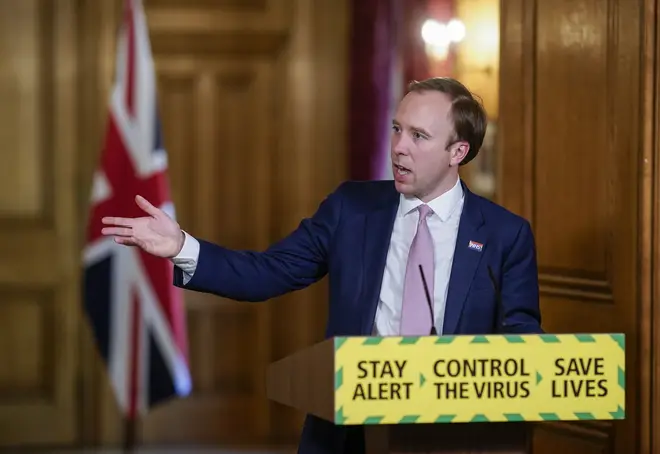
Jim Diamond 1am - 4am
1 June 2020, 18:05

The UK coronavirus death toll has risen by 111, the lowest increase since March.
There were 1,570 cases recorded in the last 24 hours - also the lowest number since March.
The Department of Health and Social care (DHSC) this afternoon said the death toll since the start of the coronavirus pandemic has risen to 39,045.
The deaths took place in hospitals, care homes and the wider community and only include deaths where coronavirus is listed on the death certificate.
Health Secretary Matt Hancock told the daily Downing Street press conference: "The data show that we are winning the battle against coronavirus.
"Today we are therefore able to make some cautious changes to the lockdown rules, carefully and safely."

Coronavirus in numbers: UK death toll surpasses 39,000
But he warned that "the disease is not done yet".
"We must all remember that in the war against this virus we are all on the same side. We have come so far together, we can take these steps together.
"But do not step too far, the disease is not done yet.
"We mustn't throw away the progress that has been made."
The figure was up by 556 from the 38,489 deaths announced on Sunday after 113 deaths were reported overnight into Sunday.
However, Health Secretary Matt Hancock said the figures had increased by only 111.
WATCH LIVE: #coronavirus press conference (1 June 2020)
— UK Prime Minister (@10DowningStreet) June 1, 2020
Speakers:
🔵@MattHancock, @DHSCgovuk Secretary
🔵 Professor John Newton, coordinator of national testing effort https://t.co/whjQksSGfb
According to the DHSC, this is due to a change in the reporting process being introduced on 1 June.
The reason for the difference in these two figures is to do with how deaths are being incorporated into historic data retrospectively.
The Government have realised they were not including coronavirus deaths where the person had been tested by commercial labs, rather than the NHS.
This is why they have added in another 445 deaths which happened before 24 May which should have been counted then, but were not.
Government deaths total across all settings, where there was a positive test, are now at 39,045.

The nation falls silent to honour key workers who have died from coronavirus
Yesterday's cumulative total announced by the Department of Health was 38,489, which is 556 below today's cumulative total of 39,045.
But since yesterday, 445 deaths have been added to the historic data.
Rather than include these 445 deaths in today's increase, the Department of Health has incorporated them within the previous cumulative total, to create a notional total for yesterday of 38,934 (38,489 + 445).
The difference between this notional total of 38,934 and today's total of 39,045 is 111, and this is the one being reported by the Government.
The DHSC explained: "All deaths before 24 May 2020 of people who tested positive through 'pillar 2' testing are included in the reported daily figure for 24 May 2020.
"This change resulted in an additional 445 deaths being included (as at 1 June 2020)."
Also at the press conference, Matt Hancock announced that testing capacity was 206,444 and said "this shows that there is extra capacity for more tests".
"Tests are available right now," he said, directing people to nhs.uk/coronavirus or the 119 phone line.

Police extinguish beach BBQ in Hove amid Coronavirus lockdown
Speaking about test and trace, Matt Hancock said the system was "up and running", adding: "It's successful, I'm very glad to report that those who are asked to isolate by the contact tracers are expressing the willingness to do so and we track that very carefully."
He added: "The level of incidence of disease has come down and so actually we have more capacity than we need, this is a good thing."
He went on: "I think to err on the side of having too many contact tracers is the right side to err on. I'd rather have too many people trained and ready to go."
Professor John Newton said it was working well, telling the Downing Street press conference: "We do have a lot of capacity."
Matt Hancock said the Government had "worked very closely and very hard" to try to ensure that lockdown easing changes were made on a UK-wide basis.
"We face this virus as one country, and I think to the very large extent that is what has happened - there are some minor differences but the major principles of the changes and the lockdown rules are the same."
Professor John Newton said "every effort" was made by scientific advisers to make rules the same across the UK, but added: "The mechanisms for implementing that advice are different."
Asked about the change to shielding advice, Matt Hancock said: "It hasn't been rushed through, far from it. We've worked for some time to make sure that any changes that we make and these are small, cautious changes, can benefit people in a safe way.
"We announced it at the weekend and I think that being able to make changes like this is important for people. It's important for - especially for those who are shielded."
He added: "Absolutely once we made the decision, including and in collaboration with all of the Government bodies, we then communicated that decision and this was the right time to be able to change that advice."